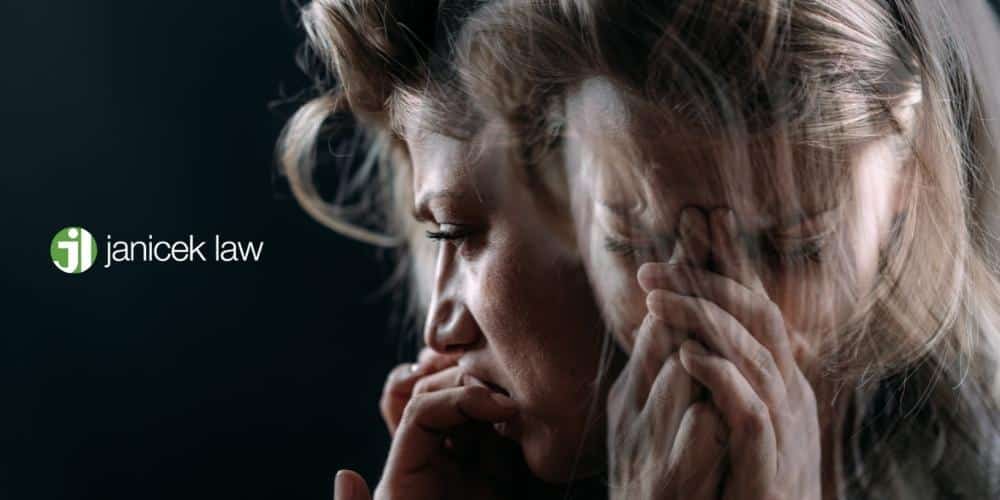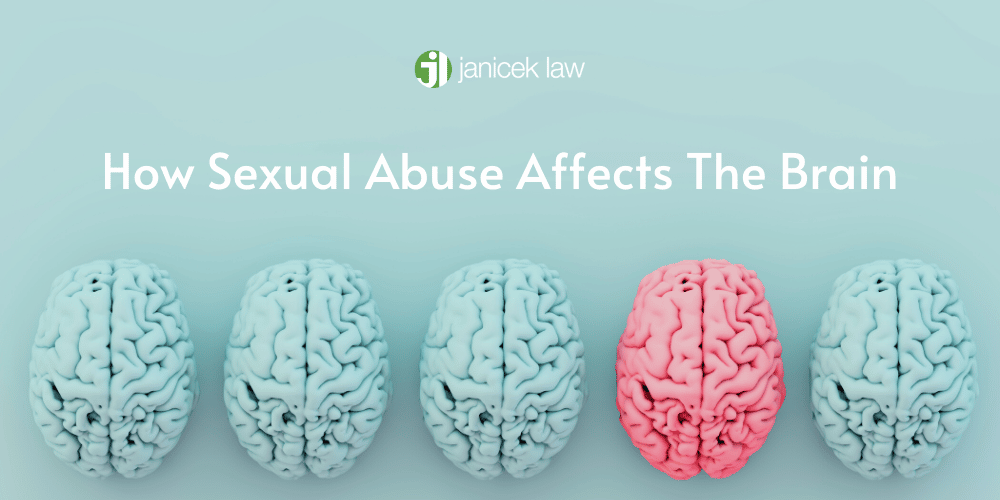According to the Centers for Disease Control and Prevention (CDC), more than half of women and nearly 1 in 3 men have endured some form of sexual abuse in their lifetime. Sexual violence of any kind is traumatic and can lead to lifelong mental and physical health problems. More recent studies have highlighted how sexual abuse affects the brain. More specifically, traumatic experiences – like sexual assault – can lead to significant neurobiological changes in the brain, which explains why many victims struggle to live and function.
If you have suffered from sexual abuse, you may have grounds to file a civil claim with our team of San Antonio personal injury lawyers. We want to provide support – legally and emotionally – during this impossible time in your life. We will listen to your story, defend your legal rights, and help you obtain compensation from the institution that failed to protect you. Call 210-366-4949 to schedule a free consultation at Janicek Law today.
What is Sexual Abuse?
Sexual abuse – also known as sexual assault – is a term that encompasses all forms of sexual violence. Common examples include:
- Indecent exposure, which is when someone intentionally shows their genitalia to another person without their consent.
- Taking, distributing, or showing pictures/videos of a sexual nature without someone’s consent.
- Any kind of unwanted physical contact of a sexual nature including molestation, groping, and fondling.
- Rape, which is forced penetration in the mouth, anus, or vagina.
- Incest, which is any sexual activity that occurs between family members.
- Forcing someone to perform sex acts upon the perpetrator.
- Engaging in any kind of sexual activity with someone below the age of consent (age 16 to 18, depending on the state).
- Engaging in any kind of sexual activity while the victim is under the influence of drugs or alcohol.
- Unwanted sexual encounters or activity within the workplace, such as sexual harassment.
- Stealthing, which is when a sexual partner removes their condom during intercourse without the victim’s consent.
- Voyeurism, which is when someone watches someone in their home or hotel room without their consent in order to receive sexual pleasure. Voyeurists commonly do this by placing hidden cameras throughout a person’s home or room.
Any form of sexual assault is always a traumatic experience for the victim, no matter how far the abuser went during the attack. For example, some people believe that molestation isn’t as “bad” as other forms of sexual assault because it’s “just touching.” The truth of the matter is that all forms of sexual abuse can lead to major physical and psychological consequences for the victim.
What is PTSD?
Post traumatic stress disorder (PTSD) is a mental health condition that anyone can develop after experiencing or witnessing a traumatic event. Many people believe that only war veterans can suffer from post traumatic stress disorder, but this isn’t true. Car accidents, birth injuries, medical malpractice incidents, domestic violence, major personal injuries, the wrongful death of a loved one, and sexual victimization are all traumatic experiences that can lead to PTSD.
According to the American Psychiatric Association, 1 out of 11 people will receive a PTSD diagnosis in their lifetime. Women are more likely to suffer from the disorder than men.

PTSD Symptoms
PTSD symptoms affect both the brain and the body. Additionally, PTSD symptoms can vary depending on the person and the type of trauma they endured. Common symptoms include:
- Severe anxiety and fear
- Recurrent nightmares about the traumatic event
- Flashbacks, intrusive thoughts, and unpleasant memories about the traumatic event
- Feeling detached from reality or the body
- Trouble concentrating on a day-to-day basis
- Self harm
- Suicidal thoughts, desires, and behaviors
- Social withdrawal and difficulty maintaining healthy relationships
- Hypersexuality or hyposexuality (if the traumatic experience in question is sexual assault)
- Chronic pain in various parts of the body
- Strong reactions to sights, smells, sounds, situations, places, and people that remind the victim of the traumatic event
- Avoiding certain situations, people, places, songs, scents, etc. that remind the person of their trauma
- Little to no self-worth
- Memory problems, such as forgetting to do day-to-day tasks or blacking out some/all of the traumatic incident
- Extreme emotions such as anger, guilt, shame, sadness, fear, etc.
- Self-destructive behaviors such as drinking, smoking, doing drugs, overeating or undereating, etc.
- Sleeping problems such as insomnia or sleeping too much
- Absolutely no interest in engaging in enjoyable activities
Not all people who experience traumatic experiences end up developing PTSD. In order to qualify for a PTSD diagnosis, sufferers must have symptoms that last longer than a month and must disrupt their lives to the point where they struggle to function on a daily basis. Some people develop PTSD symptoms right after the traumatic incident while some people develop symptoms up to three months later. Most PTSD sufferers experience lifelong symptoms.
How Many Sexual Abuse Victims Suffer From PTSD?
According to the Rape, Abuse and Incest National Network (RAINN), 94% of women who experienced sexual trauma developed symptoms of post-traumatic stress disorder within two weeks of the incident. Meanwhile, 30% of women say that they developed PTSD symptoms within 9 months of their sexual assault.
Other Mental Health Issues That Sexual Abuse Victims Can Suffer From
PTSD isn’t the only mental health condition that sexual assault survivors can suffer from. Those who experience sexual abuse have an increased risk of suffering from the disorders listed below.
- Chronic anxiety and depression
- Personality disorders
- Eating disorders
- Body image issues
- Sexuality and gender confusion
- Substance abuse and addiction
- Somatic disorders
- Schizophrenia

How Childhood Sexual Trauma Changes the Brain
In the last few decades, more and more research has come out explaining how sexual abuse affects the brain. In other words, childhood sexual abuse (and any other childhood traumas, really), quite literally changes the brain on a neurobiological level. Think about it: the brain doesn’t finish developing until approximately 25 years old. Any traumatic experience during childhood or young adulthood has the potential to change the brain’s ability to function. Naturally, these changes can lead to a wide variety of mental illnesses, decreased cognitive function, and poor brain health in general.
For example, a 2017 study included in the Industrial Psychiatry Journal claims that sexual abuse during childhood is linked to negative structural and volumetric changes of specific parts of the brain including the prefrontal cortex, the hippocampus, the cerebellum, the parietal lobes, the corpus callosum, and the superior temporal gyrus. Let’s take a closer look at how biological changes in the following two areas of the brain can lead to numerous issues.
- Prefrontal Cortex (PFC): This region is at the front of the brain. Just a few of its many functions are decision making, planning cognitive behaviors, impulse control, prospective memory, maintaining attention, and so much more. If sexual trauma changes the PFC, then sufferers can struggle with memory problems, attention span issues, decreased academic performance, difficulty making decisions, and so much more.
- Hippocampus: This region can be found deep inside the temporal lobe. The hippocampus allows us to encode and consolidate memories. Additionally, the hippocampus is involved in learning regulation. If sexual assault changes this part of the brain, then the sufferer will likely struggle with memory problems. A 2009 study suggests that changes to the hippocampus occur gradually and are generally not noticeable until early adulthood.
Neurotransmitters and the HPA Axis
Additionally, the same 2017 study linked above discusses how sexual trauma can lead to functional abnormalities of neurotransmitters, such as serotonin and dopamine. Sexual assault survivors can also suffer from hormonal imbalances due to a disruption in the hypothalamic-pituitary-adrenal axis (HPA axis). The HPA axis is a complex set of interactions between the hypothalamus, the pituitary gland, and the adrenal glands. This neuroendocrine system handles the body’s reactions to stress and also plays a role in digestion, immune health, sexuality, emotional health, and energy storage/expenditure.
The combination of all of these neurobiological changes can lead to lifelong physical and emotional health issues. The body will release stress hormones and activate the sympathetic nervous system (the fight or flight response) during the actual sexual trauma. But for many victims who later develop PTSD, this release of stress hormones will keep going. There will be continued activation of the sympathetic nervous system, even when the traumatic incident has ended. As a result, victims can suffer from chronic fear, panic, flashbacks, nightmares, cognitive difficulties, extreme mood swings, sexual problems, digestive issues, poor immune health, chronic fatigue, and so much more for the rest of their lives.
How PTSD Changes the Brain
As previously stated, not every victim of sexual abuse develops post traumatic stress disorder (PTSD). Similarly, not everyone who has PTSD has been sexually assaulted in the past. In the last couple decades, health experts have been researching how not only childhood sexual abuse changes the brain, but also how PTSD in and of itself can change the brain.
A 2006 study found that PTSD sufferers have experienced changes in the amygdala, hippocampus, and the prefrontal cortex, all of which are involved in the stress response. More specifically, the study noted smaller hippocampal volume and increased amygdala function, as well as decreased function in the medial prefrontal cortex. Additionally, this study found that PTSD sufferers typically have increased cortisol and norepinephrine responses to daily life stressors.
These findings explain why many sexual abuse victims just can’t “get over it.” Tragically, many of these victims continue to relive their trauma even years after it has passed. As a result, they may need consistent therapy and medication in order to function in society.
Healing from Sexual Abuse
Sexual assault survivors need professional help in order to heal, and there is absolutely no shame in that. In this day and age, there are so many options for therapy, antidepressants, coping techniques, grounding techniques, support groups, and more to move you out of survival mode.
If you have experienced trauma of any kind, consider seeing a mental health professional for trauma therapy and medication, both of which can help manage your PTSD symptoms. Additionally, consider joining a support group with other sexual abuse survivors. Receiving and providing support to people who have endured similar traumas can help you feel less alone. Lastly, self care is crucial for gradual healing. Work with a mental health professional to create good sleeping, eating, and exercise habits. Implementing healthy habits into your life and following a set routine is a good way to create a daily sense of safety.

Call San Antonio Sexual Abuse Lawyers at Janicek Law Today
If you or someone you love has been sexually assaulted by a teacher, a doctor, a therapist, a clergy member, a Boy Scout leader, a camp counselor, an Uber or Lyft driver, or anyone else in a position of power, you have grounds to file a civil claim. Victims tend to experience physical and mental distress for the rest of their lives because of how sexual abuse affects the brain. We believe that perpetrators deserve to be held accountable for this level of neurobiological damage.
The San Antonio sexual abuse lawyers at Janicek Law are passionate about helping sexual abuse victims seek justice and fair compensation from the institutions that failed to protect them. Call 210-366-4949 to schedule a free consultation with our team of top-notch personal injury lawyers.

